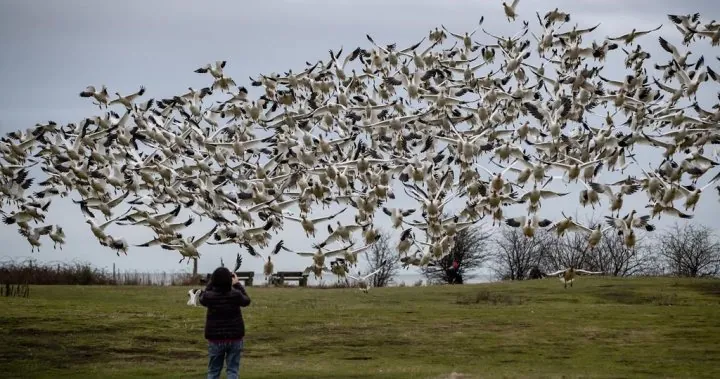
Urgent Warning: British Columbia Animal Clinics Must Combat Avian Flu Amid Human Risks!
2024-11-16
Author: Olivia
Introduction
In a crucial development for wildlife and public health, British Columbia’s chief veterinarian has mandated that animal clinics treating wild birds implement stringent protocols to mitigate the risk of avian flu transmission, especially after a reported case of human infection tied to the virus.
Veterinary Response
Dr. Theresa Burns sent a letter to veterinary clinics last week, highlighting an alarming increase in reports of ill and deceased wild birds throughout the province. With concerns rising due to fall migration patterns, she emphasized the necessity for clinics to not only establish safety protocols but also ensure that their staff are well-trained and adequately equipped with protective gear.
Human Infection Case
Shortly after this announcement, British Columbia health authorities revealed that a teenage patient has contracted avian flu while in Canada and is currently in critical condition. This case marks the first known instance of a human infection in the province, adding urgency to existing health measures.
Precautions and Public Awareness
Dr. Burns, who has actively worked since 2022 to inform veterinarians about the H5N1 avian flu virus, urged that handling of infected birds must be approached with extreme caution. "Often, well-meaning individuals pick up sick birds and inadvertently put themselves at risk," she stated. To combat this, she stressed the importance of educating the public on proper handling protocols—sick birds should be treated as potentially infected, isolated, and approached only by trained professionals equipped with gowns, gloves, and eye protection.
Rehabilitation Efforts
Rob Hope, general manager of the OWL rehabilitation facility in Delta, B.C., echoed these sentiments, noting that the center has long been proactive in its efforts to contain avian flu. Hope detailed that the facility's adeptness at recognizing signs of the disease allows them to quickly place suspected cases into quarantine under strict protective measures. Alarmingly, he reported a spike in cases over recent weeks, many of which result in fatalities within just 24 hours.
Public Health Recommendations
In light of these developments, Dr. Burns implores the public to avoid contact with sick or dead birds to help prevent the disease's spread. Prior to this recent case in B.C., the last known human infection in Canada occurred in 2014 in Alberta, where the individual eventually succumbed after reportedly contracting the virus abroad.
Ongoing Investigation
Currently, B.C. health officials remain unsure how the teenager became infected, but the risk is taken seriously. "This is a rare event, and we are vigilant in preventing any further cases,” reassured Dr. Bonnie Henry, B.C. Provincial Health Officer.
Environmental Impact
Recent environmental testing has revealed concerning levels of the H5N1 virus in wetland areas frequented by wild birds, while the overall number of infected birds reported remains comparable to previous years. However, the commercial poultry industry has faced substantial losses, with 28 flocks infected this fall alone, leading to the culling of over 6.5 million birds since the beginning of 2022.
Conclusion
The primary carriers of the avian flu are migratory waterfowl, including ducks and geese, but a wider range of species, including hawks, ravens, and herons, have been affected as well. As communities brace for the potential repercussions of avian flu, veterinarians and wildlife rehabilitation centers are on high alert, stressing that awareness and precautionary measures are vital in keeping both animals and humans safe from this infectious threat.
Call to Action
Stay tuned for updates as the situation evolves—this is a public health alert you won't want to miss!









 Brasil (PT)
Brasil (PT)
 Canada (EN)
Canada (EN)
 Chile (ES)
Chile (ES)
 España (ES)
España (ES)
 France (FR)
France (FR)
 Hong Kong (EN)
Hong Kong (EN)
 Italia (IT)
Italia (IT)
 日本 (JA)
日本 (JA)
 Magyarország (HU)
Magyarország (HU)
 Norge (NO)
Norge (NO)
 Polska (PL)
Polska (PL)
 Schweiz (DE)
Schweiz (DE)
 Singapore (EN)
Singapore (EN)
 Sverige (SV)
Sverige (SV)
 Suomi (FI)
Suomi (FI)
 Türkiye (TR)
Türkiye (TR)